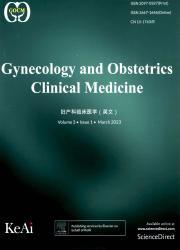Comparative study of physical activity status and food patterns in adolescents with and without polycystic ovary syndrome: an analytical approach
Q4 Medicine
引用次数: 0
Abstract
Polycystic ovary syndrome (PCOS) in adolescents causes appearance changes such as hirsutism, alopecia, acne and long-term complications, such as metabolic syndrome and infertility. This study aimed to compare physical activity status and food patterns, as prominent predictive factors, in adolescents with and without PCOS.This study was a cross-sectional study conducted on 400 adolescents at health centres affiliated with Golestan University of Medical Sciences. The data collection tools include a demographic questionnaire, a standard adolescents’ Physical Activity Status Questionnaire and a Nutritional Status Questionnaire. SPSS V.20 software was used to analyse the data.The mean age of participants was 19.16±3.18. The results of the study showed that height, weight and menstrual status were significantly different between the two groups (p<0.05). The calorie intake in affected adolescents was high, and the physical activity status was unfavourable (p<0.05).Adolescents with PCOS have been found to have different physical activity levels, nutritional patterns and calorie intake compared to non-affected individuals. This is a critical issue, as high caloric intake and insufficient physical activity can exacerbate the development of PCOS in adolescents.多囊卵巢综合征青少年与非多囊卵巢综合征青少年体力活动状况和饮食模式的比较研究:一种分析方法
青少年多囊卵巢综合征(PCOS)会导致多毛、脱发、痤疮等外貌变化以及代谢综合征和不孕症等长期并发症。本研究旨在比较患有和未患有多囊卵巢综合症的青少年的体育锻炼状况和饮食模式,因为这两项因素是主要的预测因素。本研究是一项横断面研究,对象是戈勒斯坦医科大学附属健康中心的 400 名青少年。数据收集工具包括人口统计学问卷、标准青少年体育活动状况问卷和营养状况问卷。参与者的平均年龄为(19.16±3.18)岁。研究结果显示,两组受试者的身高、体重和月经状况存在显著差异(P<0.05)。研究发现,患有多囊卵巢综合症的青少年与未患病的青少年相比,其体育锻炼水平、营养模式和卡路里摄入量都有所不同。这是一个至关重要的问题,因为高热量摄入和体力活动不足会加剧青少年多囊卵巢综合症的发展。
本文章由计算机程序翻译,如有差异,请以英文原文为准。
求助全文
约1分钟内获得全文
求助全文
来源期刊

Gynecology and Obstetrics Clinical Medicine
Medicine-Obstetrics and Gynecology
CiteScore
0.70
自引率
0.00%
发文量
35
审稿时长
18 weeks
 求助内容:
求助内容: 应助结果提醒方式:
应助结果提醒方式:


